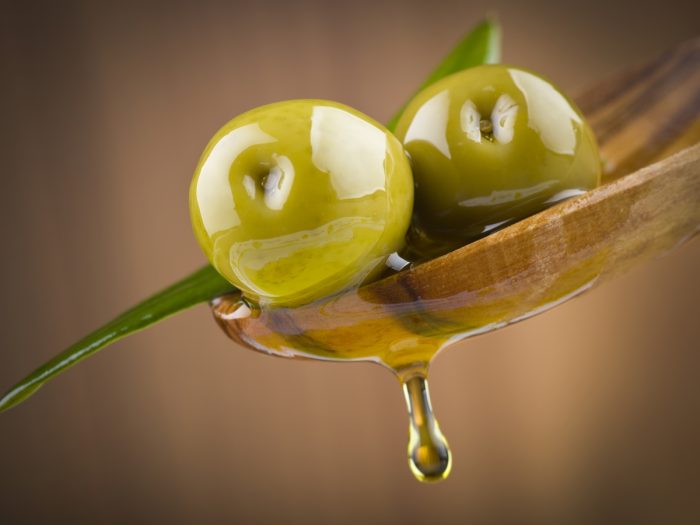There are many people who wonder about olive juice and its potential impact on health. Olive juice is often mistakenly called olive oil but olive juice is the brine that is found in jars of olives. Olive juice is essentially water, with a little bit of salt and vinegar, and cured olives that add the briny flavor to the water. A similar briny substance can be found in jars of artichokes and pickles as well. While pickle juice tends to have a few more benefits due to the nature of the pickling process, olive brine does have some potential benefits that people enjoy.
The rich and salty taste makes it a natural choice to use as cooking oil, much like you would use olive oil. It is also good when drizzled over certain acidic salads or meat/fish dishes. Most commonly, you will find the brine of olives as an ingredient in cocktails, most famously in a dirty martini. [1]
Most people simply throw away this sour juice but it is worth storing if you remember to use it in moderation.
Olive Juice Benefits
There are a few benefits of olive juice that you should be aware of that may include maintaining water balance in the body, improving nerve function, protecting the immune system, preventing chronic disease, and boosting muscle control.
May Help Maintain Water Balance
Although sodium is often considered a bad thing it is an essential mineral in the body and functions as an electrolyte, along with potassium and other critical minerals. If you take in the right amount of sodium, which olive juice has plenty of, then you are improving your health. [2]

Green olives and olive juice have a wonderful salty taste. Photo Credit: Shutterstock
May Improve Nerve Function
The presence of sodium is also critical for nerve function as it may help transmit nerve impulses in the body. Adequate amounts are important and can be gained by drinking small amounts of this juice. This is particularly good for people who are on low-sodium diets, as their nervous system may not be functioning properly. [3]
May Increase Muscle Control
For any muscle to move in the body, sodium is needed along with other electrolytes and minerals. This means that getting a healthy supply of sodium from olive juice (in moderation) is a good thing for our health. [4]
May Boost Immunity
The other components of olive juice, aside from sodium, are vinegar and water. Vinegar has been shown to have possible anti-bacterial and antioxidant properties in certain settings, which means that it can provide a healthy boost to the immune system and help you fend off infections. [5]
May Relieve Oxidative Stress
Vinegar, the antioxidant component in olive juice has had a significant amount of research done on its potential use. This can help to lower levels of inflammation in the body and lower your risk of chronic disease. [6]
Word of Caution: Brine consumption should be done in moderation, as it is extremely high in sodium. [7]
How to Use Olive Juice in Cocktails?
The most popular use of olive juice or olive brine is in cocktails as it provides a sour bite to some drinks or even a savory character that helps certain flavors stand out. The most famous cocktails include dirty martinis, Bloody Mary’s, Orange Flips and a Dirty Sanchez.
- Bloody Mary – Mix 4 cups of tomato juice, 2-3 shots of vodka, 1 tablespoon of olive juice, a dash of hot sauce, 1 teaspoon of Worcestershire sauce, and a dash of celery salt and pepper. Garnish with a celery stalk, pickle or olive spear. [8]
- Dirty Martini – Mix 2 oz. of vodka, 1/2 oz. of dry vermouth, 1/4 oz. of olive brine and three olives on a spear for this legendary olive-flavored cocktail.
- Orange Flip – Fill a shaker with ice and then add 1 part cream, 1 part Triple Sec, 1 part olive juice and 1 part egg yolk. Strain this hearty cocktail into a rocks glass for a sour, surprisingly tasty drink.
- Dirty Sanchez – Fill a shaker with ice and then add 2 oz. of aged tequila, 1/4 oz. of dry vermouth and 1/2 oz. of pickle juice. Shake well and pour into a martini glass; garnish with an olive spear.
How to Make Olive Juice?
If you want to make a larger amount of this juice, an easy way to do this is to simply purchase an existing brine-cured jar of olives and remove all of the olive juice and set it aside. At that point, you would simply create a new brine mixture and re-fill the jar of olives, allowing the juice to begin to form. However, if you have access to fresh olives, you can also make your own olive juice by filling a jar with the olives and performing the same process (outlined below). All ingredient amounts can be changed depending on your desired amount of juice.

Make Your Own Olive Juice (Olive Brine): Easy Recipe
Ingredients
- 1 cup olives whole or pitted
- 1 cup water filtered
- 1 tbsp salt
- 1 tsp vinegar
Instructions
- Wash the olives thoroughly and pierce each one with a toothpick.

- Fill a small jar about 2/3 of the way with the pierced olives.
- Mix the water, vinegar, and salt in a small bowl to create the brine solution.
- Add the brine to the jar of olives, to about 80% full.
- Seal the jar and shake it vigorously. Refrigerate the jar overnight.
- Shake when removing from the refrigerator. Strain out the olive juice from the jar into another container.
- Crush the olives in the empty jar, then add them to cheesecloth or a fine filter. Press out the remaining olive juice into the original olive juice mixture.

- Seal the jar of olive juice and refrigerate until you use it in your favorite salad dressing!

Notes
Note: Olive juice is only brine that benefits from the flavor of the olives but very few of the active ingredients. To derive the benefits of the olives themselves, the olives must be pressed to create olive oil.


